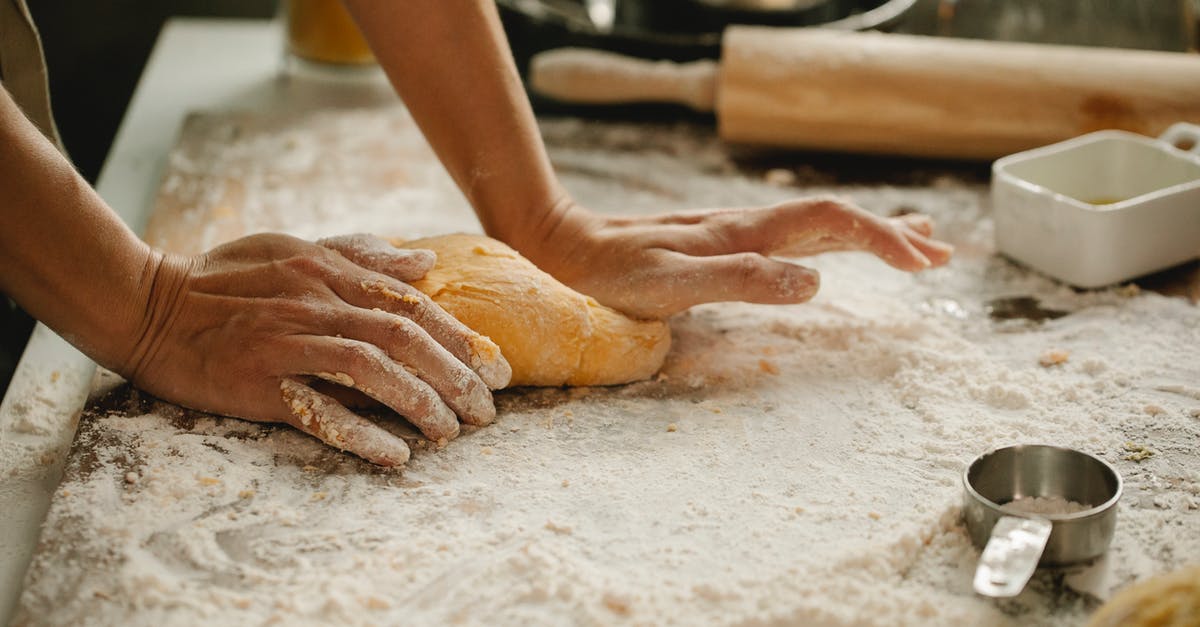Why was my bread mix really dry and take ages to knead properly?

I have been unable to find bread flour in my local grocery store, but did find a bread mix that contained three ingredients (wheat flour, salt and raising agent). Judging by the instructions on the pack to leave the dough to rise, I figured the raising agent was yeast and that it would be a decent substitute for bread flour.
My usual recipe is 750g flour, 1pkt yeast, some salt, couple tb sugar, 100ml oil and 600ml water. I treated this flour in the same way and immediately ran into issues:
- It was extremely dry. I usually like a higher hydration loaf and expect it to be quite sticky and it was behaving like a much lower hydration dough. I ended up having to add another 75ish ml to get it to be the way it should be.
- It took ages to knead. I usually knead by hand 10-ish minutes, and it must have taken a good 25 minutes to knead, and even then it didn't pass a proper window pane test, but I'd given up by that point.
Apart from the above, the rest of the process went fine, I did a doubled-in-size rise, shaped into pans and then a 30 min rise, and then into the oven at 200C for 45ish minutes. The crumb was tighter than I'm used to but it was still a decent enough loaf.
So now I'm curious what exactly this bread mix is, and exactly why this behaved so differently. My current hypotheses:
- Perhaps a lower gluten content bread.
- Perhaps a quickbread mix that actually had a chemical leavened. (but then why do they instruct to leave the bread to rise?)
Would either of these cause my mix to be really dry and take ages to knead properly? Or something else?
Best Answer
FLours differ in their ability to bind water. The reason why our recipes work with the AP flour in the supermarket is that the mills adjust the flour int he supermarket to behave in roughly the same way - and by "adjust", I mean they really measure several parameters of different grains and blend it until it performs in the usual way. (They have to change the actual blend frequently, because even with the same wheat cultivar, growing condition differences due to location and weather mean that each batch will behave differently).
I don't think there is some kind of deeper explanation here than just saying what you already observed - this flour is not formulated to behave like the typical AP flour, it produces a different amount/strength of gluten for the same amount of hydration. You might want to try baking the recipe from the package and see if you prefer it.
Pictures about "Why was my bread mix really dry and take ages to knead properly?"



Quick Answer about "Why was my bread mix really dry and take ages to knead properly?"
Too much flour can make your dough stiff and dry. And we all know what happens if there's not enough liquid present for the yeast to use: It doesn't work the way it should. So be mindful of your measurements and how much flour your dough picks up in the kneading process.What to do if dough is too dry when kneading?
If your dough is too dry, you may need to add water to the recipe. Try adding one or two teaspoons of water to the dough, and knead it. If your flour isn't too old, then you may want to try higher-quality flour.Why is my dough so tough before kneading?
The overworked dough will often feel tight and tough. This means that liquid molecules have been damaged and won't stretch properly, causing the bread to break and tear more easily. Conversely, a dough that is underworked will be harder to form into a ball shape.Why is my bread dough so dry?
The most common cause of dry and crumbly bread is having a dry dough. Dry dough can be caused by adding too much flour, the type of flour you use, or even the climate you're in. Many people add additional flour during the kneading process and it causes their bread to become dry.How do you know if your dough is kneaded enough?
After kneading the dough for several minutes, press it with your finger. If the indentation stays, the dough still needs more work. If it springs back to its original shape, your dough is ready to rest.How to hand knead a WET dough? Hand kneading technique for beginners.
More answers regarding why was my bread mix really dry and take ages to knead properly?
Answer 2
My first impression was that the flour you found was self-rising flour, but with additional information provided (thank you), it does seem that your box contained yeast as the rising agent.
Ouma bread (a traditional South African bread) is made with yeast. I believe this means something like "Grandmother's bread." Flour does become rancid over time, and rising agents become inert over time, but it sounds like your yeast was just fine.
The flour was probably bread flour with a higher protein content. If you're used to using AP flour this could account for the differences you found when kneading.
To answer your question about determining gluten content, see my answer to this question.
Sources: Stack Exchange - This article follows the attribution requirements of Stack Exchange and is licensed under CC BY-SA 3.0.
Images: Flora Westbrook, Erik Mclean, Karolina Grabowska, Klaus Nielsen

